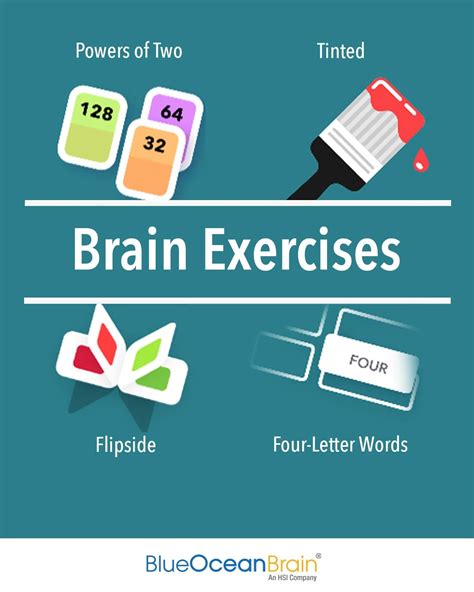Engaging in regular physical activity can significantly enhance and improve our mental state, providing a multitude of incredible advantages for our emotional wellbeing. Not only can exercise have a profound impact on our mood and mindset, but it can also positively influence various aspects of our mental health, including stress reduction, anxiety management, and even alleviating symptoms of depression.
Scientific research has consistently shown that physical activity stimulates the release of endorphins, the brain's natural feel-good chemicals, which can instantly uplift our spirits and improve our overall sense of happiness. In addition, exercise promotes the production of various neurotransmitters, such as serotonin and dopamine, which are crucial in regulating our mood, emotions, and motivation.
Through the combination of cardiovascular activities, strength training, and flexibility exercises, individuals can experience a significant reduction in stress levels and an improvement in their ability to cope with various stressors. Engaging in physical activity can provide a much-needed outlet for negative emotions, allowing individuals to effectively release tension and clear their minds, leading to a more positive mental state.
Furthermore, exercise has been found to have a profound impact on anxiety management. Regular physical activity can help individuals develop a greater sense of control and self-confidence, allowing them to better face and overcome their fears and worries. By engaging in activities such as yoga or tai chi, individuals can also learn valuable breathing techniques and mindfulness practices that can significantly reduce anxiety and improve overall emotional wellbeing.
In addition to its mood-enhancing and stress-reducing effects, exercise has also shown remarkable benefits in alleviating symptoms of depression. Physical activity has been found to increase the production of neurotrophic factors, which play a crucial role in brain health and have been linked to a reduction in depressive symptoms. Moreover, participating in group exercises or team sports can foster a sense of social connection and support, reducing feelings of isolation and boosting overall emotional wellbeing.
In conclusion, incorporating regular physical activity into our daily lives can have astonishing effects on our mental health. By stimulating the release of endorphins, regulating neurotransmitters, reducing stress and anxiety, and alleviating symptoms of depression, exercise offers a diverse range of benefits that can significantly improve our emotional wellbeing. So, what are you waiting for? Lace up your sneakers and embark on a journey towards a happier and healthier mind!
Enhancing Brain Function and Cognitive Performance

Improving the way our brain functions and enhancing cognitive performance can be achieved through various methods that go beyond traditional mental exercises. Emphasizing the importance of regular physical activity and its positive effects on brain health can lead to significant advancements in mental capacities and overall cognitive abilities.
Engaging in physical exercise stimulates the brain, promoting the production of neurotransmitters and growth factors that foster the development of new neural connections. These connections are crucial for various cognitive functions such as memory, attention, and problem-solving. By incorporating exercise into our daily routine, we can boost our brain's ability to process information effectively and improve overall cognitive performance.
Furthermore, exercise plays a key role in enhancing neuroplasticity, which refers to the brain's ability to reorganize and adapt to new experiences and challenges. Regular physical activity enhances neuroplasticity by promoting the growth of new neurons and synapses, strengthening existing connections, and improving communication between different regions of the brain. This enhanced plasticity enables our brain to learn new skills faster, adapt to changing circumstances, and better cope with stress and mental fatigue.
In addition to improving brain function, exercise also has a positive impact on cognitive performance. Research suggests that physical activity can enhance cognitive abilities such as attention, decision-making, and problem-solving. By increasing blood flow to the brain and promoting the release of neurotransmitters, exercise helps optimize cognitive processes and improves our ability to focus, concentrate, and make informed decisions.
It is important to note that the benefits of exercise on brain function and cognitive performance are not limited to specific age groups. From children to older adults, engaging in regular physical activity can lead to significant improvements in mental abilities across the lifespan. By incorporating exercise into our daily routine, we can unlock the full potential of our brains and enhance our cognitive performance in various aspects of life.
Alleviating Symptoms of Anxiety and Depression
Addressing the distressing effects of anxiety and depression can be significantly improved through various activities that promote movement and physical exertion. These beneficial practices aid in reducing the severity of symptoms associated with these conditions, providing individuals with a sense of relief and improved well-being.
Engaging in regular physical activity can have a positive impact on anxiety and depression by helping to regulate neurotransmitters and hormones in the brain. By encouraging the release of endorphins, commonly referred to as "feel-good" chemicals, exercise promotes a natural sense of euphoria and relaxation. Furthermore, physical activity can help mitigate the effects of stress, providing a form of distraction and an outlet for tension and pent-up emotions.
Exercise not only affects the brain's chemistry but also contributes to the overall improvement of cognitive function. By increasing blood flow to the brain, physical activity enhances neural connections and promotes the growth of new nerve cells. This can lead to improved concentration, sharper focus, and enhanced memory, all of which play a vital role in managing the symptoms of anxiety and depression.
Furthermore, engaging in exercise creates opportunities for social interaction, fostering a sense of belonging and reducing feelings of isolation. Participating in group activities, team sports, or fitness classes allows individuals to connect with others who may share similar experiences or challenges. This social support network can provide encouragement and empathy, alleviating the emotional burden often associated with anxiety and depression.
In conclusion, incorporating exercise into a holistic approach for managing anxiety and depression offers numerous benefits. From promoting the release of endorphins to improving cognitive function and providing opportunities for social connectivity, physical activity proves to be a valuable tool in alleviating the symptoms of these mental health conditions. By recognizing the advantages exercise brings, individuals can embark on a journey towards improved well-being and an enhanced quality of life.
Enhancing Memory and Cognitive Abilities

Exercise has a remarkable impact on our ability to remember and learn. By engaging in regular physical activity, we can significantly enhance our memory and cognitive abilities, allowing us to absorb and retain information more effectively.
1. Improved Neural Connections: Physical exercise stimulates the growth and development of new neural connections in the brain, enhancing the communication between different regions. This improved connectivity leads to a more efficient processing of information, resulting in better memory formation and recall.
2. Increased Neurotransmitter Function: Exercise promotes the release of neurotransmitters, such as dopamine and serotonin, which play crucial roles in learning and memory. These chemicals help improve attention, motivation, and our ability to retain new information, ultimately enhancing our overall cognitive abilities.
3. Enhanced Blood Flow: Regular physical activity improves blood flow to the brain, delivering essential nutrients and oxygen that are vital for optimal brain function. This increased blood flow nourishes brain cells and supports the growth of new neurons, ensuring better cognitive performance and memory consolidation.
4. Stress Reduction: Exercise acts as a powerful stress reducer, lowering cortisol levels and alleviating anxiety and depression. By reducing these negative emotions, exercise creates a more conducive environment for learning and memory. Reduced stress levels also help to improve focus and clarity, resulting in better information retention.
5. Neurogenesis and Hippocampal Volume: Physical activity has been shown to stimulate the production of new neurons in the hippocampus, a brain region crucial for learning and memory. By increasing the volume of this region through exercise, we can enhance our ability to acquire and retain new information, ultimately improving memory function.
Incorporating regular exercise into our lives is not only beneficial for our physical health but also for enhancing our memory and cognitive abilities. By taking advantage of these astonishing effects of exercise on the brain, we can reap the significant benefits of improved memory and learning abilities.
Enhancing Mood and Emotional Well-being
Within the context of the topic "The Astonishing Advantages of Exercise for Mental Health," this section explores the significant impact of physical activity on one's mood and emotional well-being.
Exercise has the remarkable ability to positively influence our emotional state and overall sense of well-being, fostering an uplifting and optimistic mood. Engaging in physical activity stimulates the release of endorphins, also known as "feel-good" hormones, which contribute to a sense of joy and contentment. Additionally, exercise provides an outlet for stress and tension, allowing for the release of pent-up emotions and promoting a calmer mind.
Regular physical activity not only enhances mood but also strengthens emotional resilience. It plays a crucial role in alleviating symptoms of anxiety and depression by promoting a greater sense of self-esteem and self-worth. By engaging in exercise, individuals often experience a boost in confidence and a heightened sense of accomplishment, which contributes to an overall improved emotional well-being.
Furthermore, exercise provides an opportunity for social interaction, fostering connections and relationships that are vital for emotional health. Participating in group activities or sports promotes a sense of belonging and camaraderie, reducing feelings of loneliness and isolation. The support and encouragement received from others during physical activity can have a profound positive impact on one's emotional state.
It is important to note that the benefits of exercise on mood and emotional well-being are not limited to a specific age group or fitness level. Whether through intense workouts or moderate physical activity, individuals can experience the mood-enhancing effects of exercise. Incorporating exercise into your daily routine can lead to improved mental resilience, overall emotional well-being, and a more positive outlook on life.
Reducing Stress and Promoting Relaxation

Enhancing well-being and fostering tranquility are some of the remarkable benefits associated with engaging in physical activity. By partaking in regular fitness routines, individuals can effectively alleviate tension and encourage peacefulness in their lives.
Boosting Self-esteem and Confidence through Physical Activity
Enhancing self-worth and developing a sense of belief in oneself are two crucial aspects of personal growth that can be nurtured through engaging in physical exercise.
- Empowering the individual: Participating in physical activities allows individuals to explore their abilities and push their limits, leading to a greater sense of empowerment and self-assurance.
- Encouraging self-acceptance: Engaging in regular physical exercise can help individuals embrace their bodies and appreciate their unique strengths, fostering a positive body image and self-acceptance.
- Promoting accomplishment: Achieving personal fitness goals and overcoming physical challenges can bolster self-esteem, as individuals witness their own progress and capabilities firsthand.
- Reducing self-doubt: The endorphins released during exercise contribute to a natural mood boost, alleviating feelings of self-doubt and promoting a more optimistic outlook overall.
- Fostering social connections: Physical activities often involve group dynamics, offering opportunities for individuals to form connections with others who share similar interests, thereby enhancing their sense of belonging and self-worth.
By engaging in physical exercise, individuals can experience a multitude of benefits that extend beyond physical health. The combined effects of empowerment, self-acceptance, accomplishment, reduced self-doubt, and increased social connections contribute to a significant improvement in self-esteem and overall confidence.
Preventing and Delaying Age-related Cognitive Decline

Introduction: In this section, we will explore the remarkable impact that regular physical activity can have on preventing and delaying age-related declines in mental cognitive abilities. The aging process naturally brings changes to the brain, which can lead to a decline in cognitive functions such as memory, attention, and problem-solving skills. However, through engaging in consistent exercise routines, individuals have the potential to mitigate these age-related effects and maintain cognitive sharpness.
Enhancing Brain Health: Physical exercise has been found to positively influence brain health by promoting neuroplasticity, neurogenesis, and improved blood circulation. Neuroplasticity refers to the brain's ability to adapt and reorganize its structure and function in response to experiences. Regular exercise stimulates the release of growth factors that encourage the formation of new neurons, helping to maintain optimal brain function. Additionally, exercise boosts blood flow to the brain, delivering essential nutrients and oxygen, thus supporting its overall health and vitality.
Preserving Memory and Cognitive Abilities: Exercise has been linked to improved memory and cognitive abilities, often regarded as the "golden years" of one's life. Studies have suggested that engaging in physical activity can enhance both short-term and long-term memory, as well as various cognitive functions such as attention, decision-making, and problem-solving skills. Additionally, exercise has been shown to reduce the risk of developing age-related cognitive decline, including conditions such as dementia and Alzheimer's disease.
Reducing the Risk of Mental Health Disorders: Regular exercise has also demonstrated its potential in reducing the risk and severity of various mental health disorders that are commonly associated with aging. Depression, anxiety, and stress are prevalent conditions experienced by older adults, and engaging in exercise has been shown to alleviate symptoms and promote emotional well-being. The release of endorphins during physical activity acts as a natural mood booster, while the social interaction and sense of purpose gained from exercise can combat feelings of isolation and loneliness.
Conclusion: The advantages of regular physical exercise extend beyond just physical well-being; they also provide a powerful means to prevent and delay age-related cognitive decline. By enhancing brain health, preserving memory and cognitive abilities, and reducing the risk of mental health disorders, exercise unlocks a multitude of benefits that contribute to overall mental well-being in the later stages of life. Embracing an active lifestyle can be a significant step towards maintaining optimal mental health and enjoying a fulfilling and enriching aging process.
FAQ
What are some of the mental health benefits of exercise?
Exercise has numerous benefits for mental health. It can help reduce symptoms of depression and anxiety, improve memory and cognitive function, boost self-esteem and confidence, and enhance overall mood and well-being.
How often should I exercise to see improvements in my mental health?
The frequency of exercise required to see improvements in mental health may vary for each individual. However, experts generally recommend at least 150 minutes of moderate-intensity aerobic exercise per week, along with strength training exercises twice a week.
Can exercise be a substitute for medication in treating mental health disorders?
Exercise can be a helpful complement to medication and therapy in treating mental health disorders, but it is not typically a substitute. It can aid in symptom management and overall well-being, but it's important to consult with a healthcare professional for a personalized treatment plan.
What types of exercise are most effective for improving mental health?
A combination of aerobic exercises, such as running or cycling, along with strength training exercises, have been found to be most effective in improving mental health. However, any form of physical activity that gets your heart rate up and engages your muscles can have positive effects on mental well-being.
Are there any specific populations that can benefit greatly from exercise for mental health?
Exercise has shown to be beneficial for people of all ages and backgrounds. However, it can be especially helpful for individuals experiencing stress, anxiety, or depression, as well as those dealing with chronic conditions like ADHD or PTSD.
What are some of the benefits of exercise for mental health?
Exercise has numerous benefits for mental health. It reduces symptoms of anxiety and depression, improves mood and self-esteem, enhances cognitive function, increases the release of endorphins, promotes better sleep, and helps manage stress.
How much exercise do I need to do to see improvements in my mental health?
The amount of exercise needed to see improvements in mental health varies for each individual. However, research suggests that engaging in moderate-intensity aerobic exercise for at least 30 minutes, five days a week, or engaging in vigorous-intensity aerobic exercise for at least 20 minutes, three days a week, can be beneficial for mental health.



